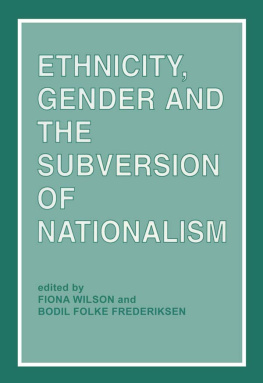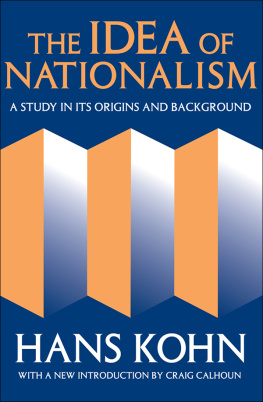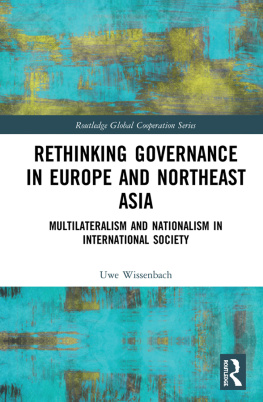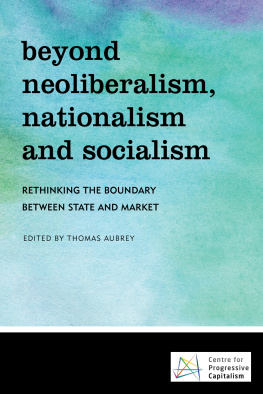Rethinking Nationalism and Ethnicity
Nationalism and Internationalism
General Editor
Mortimer Sellers
(University of Baltimore)
First published 1997 by Berg Publishers
Published 2020 by Routledge
2 Park Square, Milton Park, Abingdon, Oxon OX14 4RN
605 Third Avenue, New York, NY 10017
Routledge is an imprint of the Taylor & Francis Group, an informa business
Hans-Rudolf Wicker 1997
All rights reserved. No part of this book may be reprinted or reproduced or utilised in any form or by any electronic, mechanical, or other means, now known or hereafter invented, including photocopying and recording, or in any information storage or retrieval system, without permission in writing from the publishers.
Notice:
Product or corporate names may be trademarks or registered trademarks, and are used only for identification and explanation without intent to infringe.
Library of Congress Cataloging-in-Publication Data
A catalogue record for this book is available from the Library of Congress.
British Library Cataloguing-in-Publication Data
A catalogue record for this book is available from the British Library.
Typeset by JS Typesetting, Wellingborough, Northants.
ISBN 13: 978-1-8597-3926-6 (hbk)
ISBN 13: 978-1-8597-3931-0 (pbk)
Contents
Hans-Rudolf Wicker
Josep R. Llobera
Kurt Imhof
Montserrat Guibernau
Aleksandra lund
Carl-Ulrik Schierup
Matteo Gianni
Hans-Rudolf Wicker
Natividad Gutirrez
Christian Giordano
Donna Meryl Goldstein
Victor Shnirelman and Galina Komarova
Jurg Helbling
Georg Elwert
Gianni DAmato and Siegfried Schieder
Marco Martiniello
Cristina Allemann-Ghionda
Guide
Conducted between 1992 and 1995, COST-A2, a research project dedicated to Migration: Europes Integration and the Labour Force, was part of the European Commissions programme for European Co-Operation in the Field of Scientific and Technical Research (COST). With twenty European countries participating, COST-A2 was one of the first social sciences projects ever to be carried out in the context of the COST programme, which is otherwise dominated by issues of technology and the natural sciences. The projects pioneering role was reflected in the difficulties faced by the Management Committee of COST-A2 - of which the editor himself was a member - in its efforts to conceive, design, co-ordinate, and implement the project. Concepts, channels of information, and trans-national research networks had to be developed from scratch before the actual project could be launched successfully.
Despite certain difficulties of implementation, the research policy impulse provided by the European Commission eventually produced a considerable range of interesting results. The most visible sign of the success of COST-A2 were the various interdisciplinary workshops and conferences organized in many European countries, during which a wide range of research findings were exchanged, discussed, and finalized for publication. One of these conferences took place from 24 March 1995, at the University of Berne. The very broad theme of the conference - Nationalism and Ethnicity - was broken down into the following three sub-topics: Ethnicity and the Construction of Identity, Ethnicity and the Nation-State and Ethnicity and Nationalism in Eastern Europe. Thirty speakers presented their papers, and their findings were deepened in the lively discussions that ensued. With the publication of the present volume, some of these papers are now available to a wider audience. Considering the highly topical nature of the articles in this collection with respect to both politics and the social sciences, we feel quite certain that this book will contribute to a more informed discussion of the issues surrounding nationalism, ethnicity and multiculturalism.
We want to express our gratitude to all those individuals and institutions who, in one way or another, helped to bring about the Berne conference and the present publication. In particular, we thank the Commission of the European Union, the Swiss National Science Foundation, the Office Fdral de lEducation (Berne), and the Max and Elsa Beer-Brawand Foundation (Berne) for the financial support of the Berne conference. Special thanks go to the Office Fdral de lEducation for its generous financial support of pre-publication work and for its substantial contribution towards the cost of printing. Last but not least, I am very grateful to Dr Ueli Hostettler of the Institute of Ethnology at the University of Berne, who took upon himself the less than easy task of preparing the present volume.
Hans-Rudolf Wicker
Postmodernism, Production of Meaning and Hidden Agendas
There is a broad consensus among social scientists today about the theoretical status of ethnic, cultural and national categories. Indeed, one is even inclined to say that a canon has developed around these concepts - a canon that now fairly dominates the discussion, the gist of which can be summarized as follows: there is no such thing as an ethnic, cultural, or national essence; formations which appear as ethnic groups, as cultures, or as nations should no longer be considered as suprasubjective wholes that generate and determine human action. Instead, they should be interpreted as the products of history, therefore as resulting from concrete acts that are motivated by peoples interests. Such formations are constructions naturalized by social actors in the interest of their own social standing; only then are they equipped with a coherent history and a homogenous, territorial character. What social scientists are expected to do according to this theoretical canon, then, is to examine which social actors participate in generating such concepts of ethnicity, culture and nation, and to locate the strategies and processes of construction that are used to make such totalities become real. Thus, like social classes, ethnic groups, cultures and nations are thought to exist not in themselves but only for themselves.
Accelerated by the crisis of representation in the social sciences that took place during the 1980s and swept away the last vestiges of classical representation, the paradigm shift from suprasubjective wholes, structuralism and functionalism to interest-guided social actors is now complete; this is what Alain Touraine (1988: 10) has referred to as bringing the social actor back in. This change has become evident as a growing number of manifestos by social scientists implicitly or explicitly renounce all future use ofessentialism in favour of a renewed interest in constructivism (Keesing, 1994; Vayda, 1994; Friedman, 1994: 6777). In recent years, anti-essentialism has become a prominent academic attitude and considerable scientific energy has been spent to prove the poverty of primordialism (Eller and Coughlan, 1993) -although much of this activity produced no more than yet another critique of certain well-known passages from Shils (1957) and Geertz (1963: 109), the two social scientists credited with being the first to use the concept of primordialism. The anti-essentialist and anti-primordialist fervour spreading through academic institutions is not primarily the result of an extraordinary leap of knowledge, even though such a leap could be inferred from the emergence of post-structural and postmodern thinking. Instead, it should be seen as an attempt to create a moral distance between the social sciences and the powerful fundamentalisms that are currently shaking the world and could- according to Huntingtons analysis (1993) - lead to a clash of civilizations. To be sure, the scientific community, alarmed by the recent rise of essentialist and primordialist thinking, is trying to take a definite stand against a social development which is gaining in strength despite of, and in contradiction to, the warnings sounded by social scientists. Whether in the garb of religious sectarianism and cultural puritanism or under the guise of nationalism, racism, ethnic cleansing, or political tribalism, all current essentialisms are forms of social, political and symbolic action used to dogmatize and ruthlessly implement processes of inclusion and exclusion; as such they are in fundamental opposition to the principles of an open society as defined by Popper (1945). The current anti-essentialism, notably prevalent in North American and European academic circles, is therefore far more than just an expression of a new scientific insight. It forms part of a larger discussion about the values and norms that will determine the future development of humanity. It is worthwhile, therefore, to take a closer look at (1) how this anti-essentialist discourse is being conducted in the social sciences, (2) to examine what answers the social sciences have been finding with the fundamental epistemologies, as Byron Good (1994: 7) has aptly termed them, and (3) to illuminate the background that provides the framework for the new anti-essentialist conceptions. It is in dealing with this last point that my critique of an excessive use of the poststructuralist approach in the social sciences will first be sketched out. By answering these questions we will provide a general context for the discussions collected in the present volume. (1) The scientific examination of primordialism and essentialism from a poststructuralist point of view involves two tasks. It is necessary to demonstrate, firstly, that the primordial and the essential are not given but constructed by human beings for specific purposes, and secondly, to show how the social sciences of the classical period contributed to the construction of complex wholes (Tylor, 1958 (1871): 1) such as nations, cultures, and ethnic groups, that is, to concepts that proved very congenial to the essentialist spirit of the modern age. In the hands of social scientists, constructivism is transformed into an instrument of deconstruction, of the very strategy, in other words, which has become the defining characteristic of scientific postmodernism (Denzin, 1994). Revealing the constructed nature of social reality entails the deconstruction of the underlying forms of knowledge which serve to legitimize this process. The methodological leaps required to launch the deconstructivist enterprise have involved a radically different approach to the classical writings of science: they are no longer read as descriptions of reality but as autonomous texts that generate reality and, in so doing, reflect the intentions of the author, as well as the ideologies and the relationships of power in their time. Edward Saids (1978) book,










